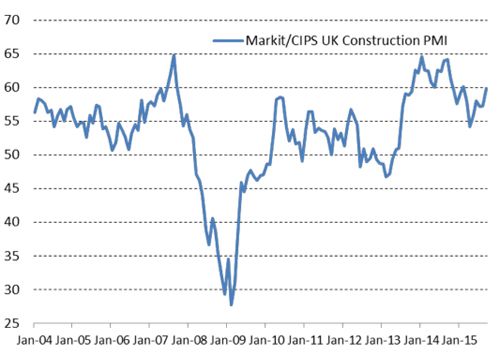
The strongest rate of growth in house-building for a year has helped push the construction industry to a seven-month high, despite concerns over diminishing levels of new work and increasing pressures around skills.
According to the latest Construction PMI from Markit and the Chartered Institute of Purchasing & Supply (CIPS), September’s 59.9 figure marked a sharp increase in overall business activity from August’s 57.3. The latest reading was well above the long-run survey average (54.7) and pointed to the fastest increase in output levels since February.
House-building continued to drive increasing activity in the construction sector, with the latest expansion of residential building the strongest for 12 months. However, faster rates of growth were also measured in all broad categories of construction.
Commercial construction activity rose at the fastest rate for seven months while civil engineering increased for the fifth consecutive month at the fastest rate of expansion since February.
Tim Moore, senior economist at Markit and author of the Markit / CIPS Construction PMI, said: “Construction firms enjoyed a strong finish to the third quarter of 2015, as a sustained rebound in new development projects continued to have an impact on the ground.
“Residential building saw the most decisive momentum shift in September, hitting a one-year high in the process, while commercial development also picked up speed as rising business investment and improving UK economic conditions acted to bolster demand. A growth spurt for civil engineering activity completed the hat-trick of positive news for the main construction sub-sectors in September, helped by robust pipelines of infrastructure work.”
Despite this positive news, volumes of new work continued to slow in September with the latest increase least marked for five months. In addition, employment growth continued across the construction sector for the 28th month with the pace of hiring accelerating at its fastest rate since June. The continued intensity of job hiring throughout the industry suggests skill shortages remain a dominant concern.
David Noble, group chief executive officer at the Chartered Institute of Procurement & Supply, said: “Issues around skills shortages continued to be a drag on the sector with the resultant demand for higher salaries from the smaller pool of skilled staff. Companies reported higher staffing levels but it was a continuing challenge to find specialist skills as they struggled to rely less on sub-contractors to fill the gaps.”
Despite these challenges, confidence among the survey respondents remained strong, with 52% forecasting an upturn in business activity, while only 6% anticipate a reduction.



